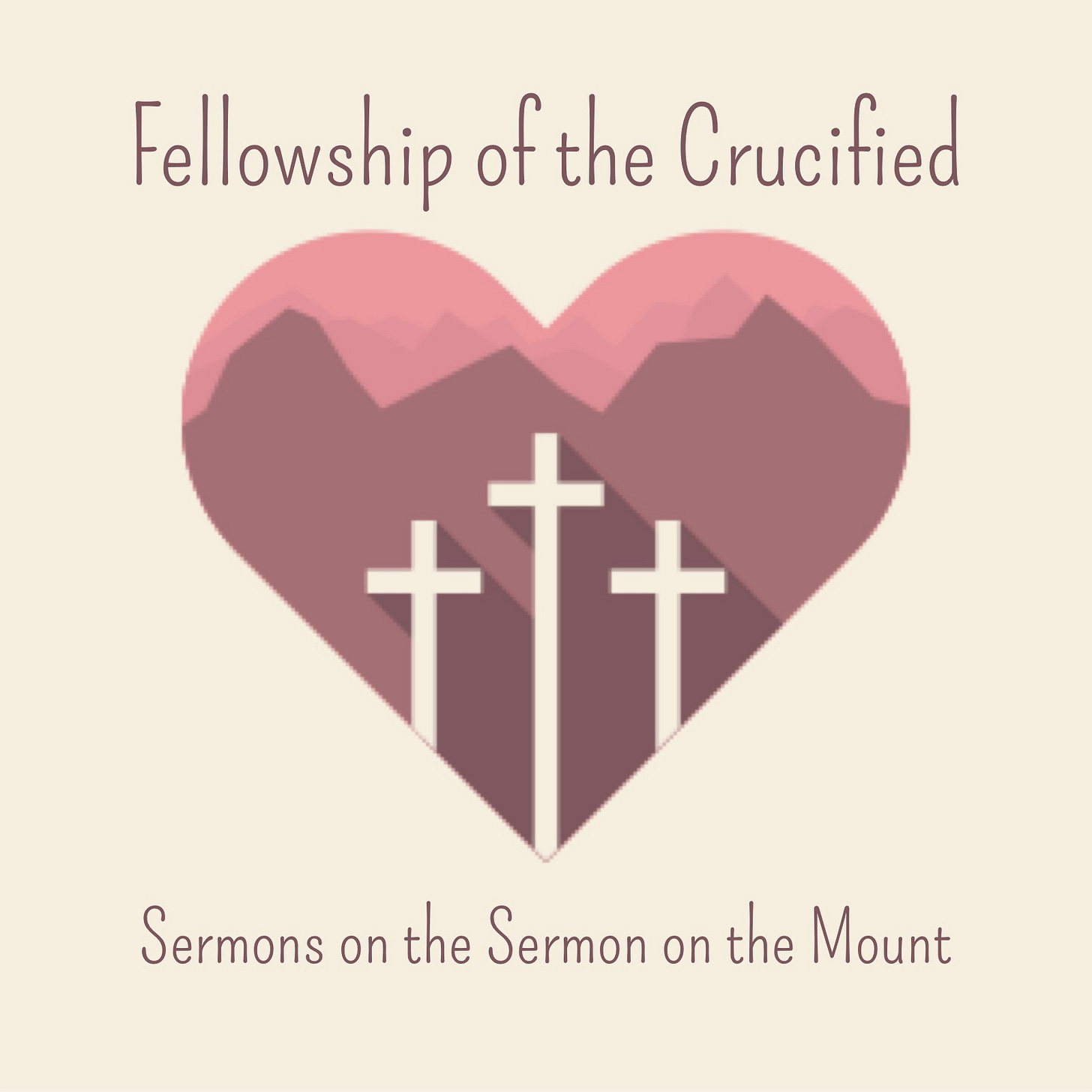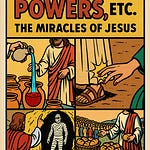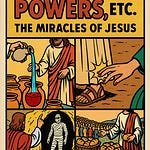Matthew 5.10-12
“I am a Christian.”
This is the sole explanation offered by an otherwise anonymous second century disciple who, upon his baptism, took the name Sanctus; meaning, holy. According to his account in Acts of the Christian Martyrs (a collection of trial records older than much of the New Testament), Sanctus gave no other testimony to the imperial inquisitors who were charged with torturing him in order to induce a refutation of his devotion to Christ the Lord. Asked about his birthplace, his nationality, his rank, his pagan name, Sanctus yielded no answer except, “Christiana sum.” Though no doubt lost on his interrogators, Sanctus’s stubborn response was but a way of insisting that every trace of his previous identity had been forever washed away, subsumed by the waters of baptism, such that Christ superseded every other possible explanation for his odd way in the world. No part of Sanctus’s past was as determinative as the fact that his life was now hid with Christ in God.
Where were you born?
I am a Christian.
Where are you from?
I am a Christian.
What’s your status? Are you a citizen or a slave?
I am a Christian.
What’s your name?
I am a Christian.
Sanctus maintained this spare, simple testimony even as he underwent horrific brutality, his abused body “being all one bruise and one wound, stretched and distorted out of any recognizably human shape.” The grisly details of his end conclude with understatement, “He too was accepted into the ranks of the martyrs.”
“Blessed are those who are persecuted because of righteousness for theirs is the kingdom of heaven.”
Another disciple among the first generations of the Church, Polycarp was arraigned by a Roman governor before a crowd gathered for the gladiatorial games. Possibly out of pity, the governor implored the Christian to show some common sense and to face reality. “Have respect for your situation,” the governor pleaded with Polycarp, “Recant. Say, “Away with the atheists!” Again, recall that into the fourth century Rome regarded Christians as atheists for having renounced the very existence of Rome’s gods.
“Have respect for your situation. Recant. Say, “Away with the atheists!””
But Polycarp no longer took the givens of the “real world” as given. As a follower of a risen Lord, Polycarp knew the way the world is is not the way world need be. The real world is the one revealed through cross and resurrection not the judge’s gavel or the hangman’s noose. Therefore, in an instant, as though he was not the powerless one at all, Polycarp stole the words of his accusers and wielded those words back against them. According to the historical record, Polycarp glanced soberly at the mob in the arena and, slowly turning across the circumference of his audience, he shook his fist at them and shouted, “Away with you atheists!”
“Blessed are you when people insult you, persecute you…”
Likewise, Speratus was one of the Scillitan martyrs who refused to accept the definitions Rome gave to terms like lord, king, and emperor. On trial for following Jesus, Speratus rejected the auspices of his inquisitors’s authority: “I do not recognize the empires of this world. Rather, I serve the God whom no man has seen, nor can see, with these eyes. I have not stolen; and on any purchase I make I pay the tax. Yet, I acknowledge only one Lord— my Lord and my God— who is the emperor of kings and King of all the nations” Rome took Speratus’s life but they could not determine the meaning of his death. And that spelled doom for Rome.
“Blessed are you when people say all kinds of evil against you because of me. Great is your reward in heaven, for in the same way they persecuted the prophets who were before you.”
Speaking of heaven—
The New Testament culminates in a vision of the saints robed in white, surrounding the throne of the Lamb who was slain. The image asserts in no uncertain terms that the Lamb’s exercise of dominion is inseparable from and unintelligible without the witness of those disciples who have followed their lord even unto death.
Put another way— put the way Jesus puts it in the Sermon on the Mount— if Christianity had no martyrs, there would be no Christianity.
The martyrs are every bit as necessary to Christianity as the empty tomb.
If the community of discipleship is constituted by those who suffer persecution on account of Christ, then a community without those who so suffer is a community without true discipleship. In other words, if following Christ is easy and without cost then it’s but an indication that you’re not following Christ.
We are only able to be Christian by the sacrifice of the martyrs.
Just like the sanctuary doors of many churches, the paraments on the altar are red not only because the Holy Spirit comes at Pentecost as tongues of fire but also because the new community of discipleship that the Holy Spirit creates is a Church built upon the blood of the martyrs. The essential prominence of the martyrs for the reality of the Church may be an assumed element of Christian dogma; nevertheless, as followers of Jesus Christ and as citizens of his peaceable Kingdom, I think it crucial to ask the question, “Is this good?” Is it good new that martyrdom is a constitutive characteristic of the community of discipleship? Over two thousand years later, in a world beset by a variety of extremisms and their violence, is it yet a good to confess that without the blood of martyrs there is no Body of Christ?
Are the martyrs just a macabre part of the Church’s tradition?
For instance, after the bloodied and beaten Sanctus offered his inquisitors no reply other than “I am a Christian,” he returned to the public amphitheater for a second round of torture. According to the trial record, Sanctus appeared “cooled and strengthened” by having made his confession of faith and “to the men’s complete amazement, his broken body unbent and became straight under the subsequent tortures; he recovered his former appearance and the use of his limbs. Indeed the second trial by the grace of Christ proved to be not a torture but rather a cure.” Is this not a romanticizing of suffering, a mythologizing of violence— is this not the very sort of religious radicalism the world would be better off without? I mean, it’s one thing to give up your life for your country— that’s patriotism, right?. It’s another thing entirely to lay down your life for the Lord— that’s fanaticism, we think.
Are the Christians who walked into the mouths of lions while praying the Lord’s Prayer substantively different than the zealot who ignites an IED in a crowded marketplace?
Is it still good news that we profess that the Church is built on the blood of the martyrs?
Just this Friday, I was drinking coffee and people watching in the Istanbul airport. A couple walked by me carrying a shopping bag from one of the many designer stores. They were in the twenties or thirties. She was draped in black with only her dark spectacled eyes visible. It so surprised me I had to do a double-take: he was wearing a worn, cream-colored t-shirt. On the chest was a cracked and faded screen-printed image of one of the twin towers with a plane about to strike it. Presumably to shock someone like me, the caption was written in English, “God is great!”
Before I confirm any of your prejudices with that story, here’s another story:
Just last week the Turning Point USA conference— a pep rally for right wing college students— in Tampa featured members of NatSoc Florida—as in “national socialism,” Nazism. They posed on the convention center steps, their faces obscured by dark sunglasses and white neck gaiters. Their gaiters and red shirts said “NSF,” with the “S” written as Nazi SS lightning bolts. They carried a Nazi swastika flag and a Black Sun flag along with signs that said, “Free the J6 Political Prisoners.” Meanwhile, inside the convention, a member of congress, using the Christian nationalist language of apocalyptic struggle and armed violence, declared, “There is an identity crisis in America today and the only place you’re going to find that identity is in Christ…as Christians we are in a fight for the battle of our nation.”
This is the world in which we live. In such a world is it still part of God’s care for the world that the Church in the world confesses that it is built not on the blood of heroes but of martyrs?
The philosopher Friedrich Nietzsche, the great and impassioned enemy of the Christian faith, wrote in his treatise the Antichrist:
“It is so little true that martyrs prove anything as to the truth of an affair, that I would fain deny that ever a martyr has had anything do with the truth.”
Was Nietzsche right?
Does martyrdom have nothing to do with the truth?
I realize you likely did not come to worship today to hear about the tortures with which someone like Polycarp met his end; however, the witness of such martyrs is not the abstraction we should like it to be for Christ not only concludes his beatitudes with the expectation of suffering and persecution, the ninth and final beatitude is the only beatitude that Jesus puts in the form of direct address. Notice, the announcement of blessing is in the second person plural.
It’s not them: “Blessed are those whom people revile and persecute.”
It’s you: “Blessed are ya’ll when people utter all kinds of evil against you falsely on my account.”
It’s you. It’s all of us.
According to Jesus only some in the community of discipleship are peacemakers.
Not every disciple is merciful or hungers after justice.
But everyone in the community of disciples should expect to be rejected by the world.
Suffering, persecution, martyrdom even— they’re an ever present possibility not for some of Jesus’s followers but for all. That the beatitudes culminate with the anticipation of persecution should not surprise us. A community constituted by those who have renounced prosperity, happiness, rights, honor, vengeance, and violence is a community where all should expect to meet with ridicule, slander, and possibly much worse.
For example:
In the ancient Church, when a Roman solider converted to Christianity the Church required the new Christian to find a new job. The new Christian did not need to leave the military but the new Christian did need to secure a role where they would not be in the position of taking another’s life, whether taking that life was justified or not.
Just imagine how suspect Christians in America would immediately become if the Church in America exercised those kinds of expectations for what it means to follow Jesus in America. Just imagine the reaction if Christians could not be counted upon to kill on behalf of America. Whether or not you’re in the military, you would all be guilty by association. None of you could be trusted as good Americans.
Can you feel it?
This is why Rome persecuted the first Christians. It wasn’t because Christianity was a sin management system. And it wasn’t because Christians believed God had made Jesus the Secretary of After Life Affairs.
Rome persecuted Christians because the way of Christ made Christians unreliable Romans.
Perhaps this is why we instead put flags in our sanctuaries and speak of America as a Christian nation. It’s a way to avoid that all inclusive “you” with which Jesus concludes the preamble to his Sermon on the Mount.
We are not all called to martyrdom.
But we are all called into a community whose way of life is so offensively counter-intuitive that we should expect some may die on account of it.
Still, to announce that martyrdom is a possibility to be countenanced is not also to claim that martyrdom is a good to be celebrated. So the question remains: are the martyrs really good news for us today? Or is Nietzsche right? Do they have nothing to do with the truth? God is a God of mercy and love. Jesus said he has come so that we might have life and have it abundantly? How is it good to extol suffering and death? How is it good news that the Church is built on the blood of the saints?
Until recently Richard Lischer taught homiletics at Duke. In doing research for a book on the preaching of Martin Luther King Jr, Lischer interviewed listeners who had been present when Dr. King would rush to the scene of a church bombing or a Klan demonstration or a police riot and preach in the still smoldering ruins. Over the course of his interviews with listeners Lischer discovered that hardly any of the famous preacher’s hearers could recall what he had said. But, Lischer writes, every single one of Dr. King’s hearers said they would never forget where he had said whatever it was that he had said.
They could not recall the what.
But they could not forget the where.
That is, what they remembered is that King had so loved them as to place his life in danger and speak the truth.
We exist in a sea of words, Lischer says, where much of our speech is debased. Thankfully, God continues to call some, like Dr. King, to preach the truth of the Gospel with their lives.
Celsus was an ancient Greek philosopher and a bitter opponent of Christians. Celsus was the Nietzsche of the second century. Prompted by fellow believers, the church father Origen responded to the pagan’s attacks in a treatise entitled, Against Celsus. Yet even at the beginning of his long response to Celsus, Origen admits that he is reluctant to answer the philosopher’s attacks with his words or his wisdom.
Christ himself was silent in the face of his accusers, Origen writes, “and even now Jesus continues silent before these things, and makes no audible response, but instead places his defense in the lives of his genuine disciples, which are a pre-eminent testimony.”
The only utterance the silent Christ offers to his inquisitors is the lives of those whom he calls to follow him; that is, those who proclaim his Kingdom with their lives.
When a Roman proconsul asked his Christian prisoner, a believer named Pionius, “Why do you rush towards death?” the disciple replied matter-of-factly, “I’m not rushing towards death. This just is the way, the truth, and the life.” Later, according to the trial record, after he had been nailed to a cross, the executioner made Pionius an offer in an attempt to persuade the crowd that Pionius’s convictions were all a lie. “Change your mind and the nails will be taken out.” Pionius responded by bearing witness in a winsome manner, “I feel the nails are there to stay.” To recant his faith, he insisted, would be to love his body more than he loved his Lord. To alleviate his own suffering, he argued, would be to love himself more than he loved his neighbor for his neighbors needed to see that the promises of Christ can be trusted at any time or place.
Before he was nailed to a cross, Pionius protested to the temple inquisitor, “You have been ordered either to persuade us or to punish us. You are not persuading us. So, inflict the punishment. And let your punishment be my means of persuading.”
It’s about persuasion.
It’s about peaceful persuasion.
Put another way, martyrdom is always a necessary eventuality for any community that refuses to take life.
Nietzsche could not believe that the martyrs could have anything to do with the truth because Nietzsche refused the possibility that the truth could be the nonviolent love of a crucified God born by Mary.
The Christian martyr is not like the terrorist.
The Christian martyrs are not those who in their zeal for the Lord seek to lose their lives (or sacrifice the lives of others). The Christian martyrs are those who in their zeal for the Lord love their neighbor even though such love might mean giving up their lives. The martyrs are those who were willing to die to those who persecuted them rather than run away in apostasy or retaliate with violence. As Karl Barth says, the martyrs are those witnesses who are able to see even in their darkest most frightful hour the possibility for “a radical moment of reconciliation.”
Because Christ has destroyed Death, they believed the resurrection set them free to inhabit stories in which they were not the heroes, stories in which even their deaths could be used to bear witness to the God who loved his enemies as himself.
The martyrs, therefore, are intense exemplifications of what is true of the whole community of disciples. They show us that no event or determination can bring an end to the story in which Christians find themselves. Like an improv troupe, the martyrs are disciples who are always able to move the story of Christ forward. They are able to live ad hoc according to the way of Christ, improvising the next faithful step no matter the situation the world thrusts upon them.
Nor are such witnesses relics of antiquity.
According to Oxford University, from the first century to the end of the twentieth century, approximately 70 million Christians had been martyred for their faith— 65% of those martyred died in the twentieth century alone. In the twenty-first century, an average of two hundred and seventy Christians worldwide die every day on account of Christ. Oxford projects the total number for the year 2025 at 210,000. And to think some take gay school teachers in the classroom or “Happy Holidays!” at Starbucks to constitute persecution.
Despite the hysteria in some dark corners of our media, most of us will not die martyrs’s deaths; nonetheless, the martyrs are grace to us.
They are a gift we do not deserve, for in the part of the Gospel story that you and I call “the present day,” you and I can follow Jesus further and more fully than we would ever dare imagine if we had not the witness of the martyrs.
The demonstrate that, when it comes to following Jesus, our reach nearly always exceeds our grasp.
We make so many excuses for why we cannot follow Christ in the manner Christ clearly thinks we are able to follow him. Sometimes we even so construe grace that it seems as though Christ came to set us free from Christianity. We make so many excuses. I know I make excuses. Thank God that God has given us the witness of the martyrs for they are proof that we need not be Christ in order to be Christians.
We need not be Christ in order to be Christians.
A friend of mine, Venció López, is an agronomist in Guatemala. Though a scientist, he works for the Catholic Church with the Archdiocese of San Marcos, in their office of environment and justice. The bishop of San Marcos has been a fierce and stubborn advocate for the indigenous communities whose land and homes and water have been damaged by mining companies from Canada and the United States. Venció works to document pollution to communities’ s water supply, birth defects due to the mining runoff, as well as mud slides and toppled homes caused by seismic dynamiting and drilling. Because of his persistence, Venció has had multiple attempts on his life. His wife and children were nearly kidnapped and disappeared. He’s been smeared and threatened. He’s followed constantly. He’s always changing his phone, and the last time we spoke in person he’d switched cars three times to get there in safety.
When he told me about switching cars, I replied in my standard pastoral tone of voice, “Are you crazy? You can’t fight back. Why don’t you stop? Quit what you’re doing. Get away. Do something else. Your children are going to suffer for your convictions.”
Venció shrugged his shoulders and said— as though it was the most robust explanation possible for his life, “I am a Christian.”













